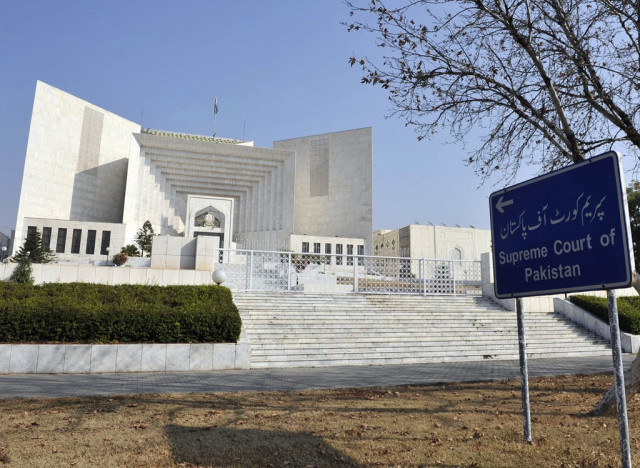SC refers Thar coal gasification project to NAB
AGP unearths massive irregularities in project execution

Supreme Court of Pakistan. PHOTO: AFP
The Auditor General of Pakistan (AGP) has unearthed massive irregularities in the execution of the Underground Coal Gasification (UCG) project at Thar.
During the previous hearing, the Supreme Court had asked the AGP to carry out an audit of the project on a war footing and ordered the chief secretary of Sindh to take into safe custody all equipment and machinery of the project.
The AGP, while submitting audit report, accused the Planning Commission as well as the Sindh government of not playing their due role in the successful implementation of the project.
The project was to be executed by member, Planning Commission, Dr Samar Mubarakmand.
In 2009, the project was conceived to generate power through the underground coal gasification process. Three PCs were approved during 2009 and 2010 by the Planning Commission.
SC orders audit of Thar coal power project
The funding of the first two schemes approved by CDWP and ECNEC commenced in April 2012 while 100% funds were utlitised till June 2012.
However, major components as approved under the relevant PC-I were not procured despite utilisation of all funds under the subject schemes, says the audit report.
"Due to ill planning, the UCG project had to face several issues during its execution. Due to non-preparation of feasibility study, it was unclear whether underground coal gasification was a commercially viable project
"[Also, the absence of an environmental impact assessment study prior to the initiation of the project was always going to be an issue," says the report.
Taking congnisance of the report, three-judge bench headed by Chief Justice of Pakistan Mian Saqib Nisar referred the matter to National Accountability Bureau (NAB) to take action against responsible persons for causing huge losses to the national exchequer in Thar coal gasification project.
The court also asked the federal and Sindh governments to conduct a study to ascertain whether the project was feasible or not. "Both the governments have been asked to take decision within six weeks."
The AGP in its report states that the third scheme -- namely 2x50MW Power Plant from Syngas was approved by ECNEC in December 2010 before the completion of two schemes.
Subsequently, Rs1,800 million were released in two phases, i.e., Rs900 million in 2012-13 and Rs1,000 million in 2013-14.
During FY 2012-13 to FY2017-18, Rs3,713.84 million was released for the third scheme without any technical appraisal by the Planning Commission.
From 2009-18, the total expenditures on the three schemes was Rs4,697.66 million.
The report said the project record has not been maintained in an efficient and systematic manner. In many cases, either important documents were missing from the files or record was not being maintained at all.
The report further states that the Planning Commission as well as the Sindh government did not play their due role in the successful implementation of the project.
Procurement of machinery and equipment remained a big problem throughout the execution. "On several occasion re-tendering was done which indicated ill preparation," the report adds.
Owing to the absence of technical consultancy, the report states that the project was never going to be complete on time.
"As regards cost-benefit ratio, stream of benefits could not accrue as the project could not be made operational. The project management could not even generate enough power to run its own plant and provide electricity to its residential colony," says the AGP in its conclusion.
The report also says that financial releases were irregular that led to the disruption in project operations. "Ill-planned execution and poor monitoring by governing body/energy department, Sindh government, further impeded the operational activities."
Despite spending billions on the project, it has not been able to deliver as per PC-I objectives. "Over-ambitious targets as stated in PC-I were noticed. Project management was not able to meet the deadlines as set out in PC-I of project," says the report.
The AGP also noted that the situation further aggravated when the project authorities failed to satisfy the technical appraisal committee during its visit in May, 2012 regarding successful end to the end-cycle production. "This created doubts regarding viability of the project."
"It is high time the authorities concerned took critical decision regarding the future of the project. A detailed technical review may be carried out by third party regarding sustainability of the project and based on the recommendation of the that committee, future of the project may be decided," the AGP recommends in its report.
It is also proposed that the projects of national importance must be deliberated thoroughly before approval of PC. Likewise, feasibility study must be ensured in highly complex and technical projects. The report says that the governing body did not endorse the recruitment of 474 employees.
The AGP report also reveals that despite several reminders, relevant record could not be provided.
The audit is of the opinion that two subsidiary accounts were opened to defeat the condition of 'lapsability' of funds and utilise the funds as per discretion of the project authorities.
"This practice has continued for the last eight years and reflected financial indiscipline and lack of transparency," says the report.
The audit report revealed irregular purchase of pipes and vales worth of 50 million while doubtful expenditure on drilling rods worth of $0.712 million.



















COMMENTS
Comments are moderated and generally will be posted if they are on-topic and not abusive.
For more information, please see our Comments FAQ